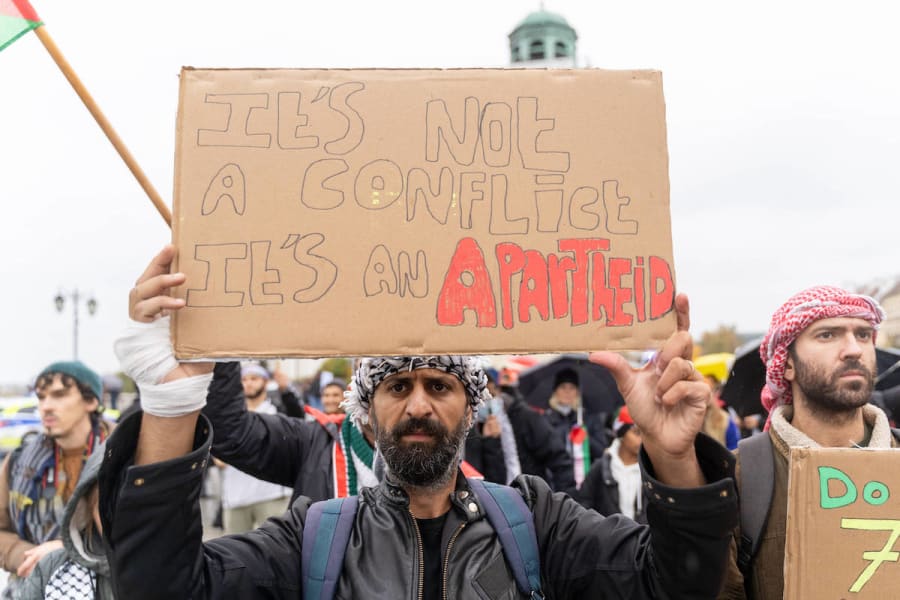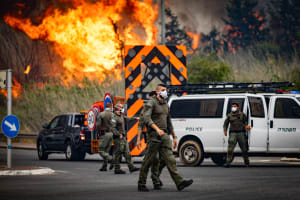Is an increasingly isolated Israel a prophetic sign?
What changing opinions and alliances indicate about the ‘signs of the times’

Given the strong support for Israel shown by leaders of the United States and several European countries immediately after the horrific attacks on Israel by Hamas on Oct. 7, one might be forgiven for being surprised at the dramatic loss of support Israel is currently experiencing around the world.
A question for many believers is whether the lack of global support and even widespread antagonism towards Israel at this time is prophetically significant.
With many believers questioning if Israel is currently in a Psalm 83-type war, or possibly even in the lead-up to the fulfillment of the prophecy of Ezekiel 38, it would be helpful to look at some of the recent events in order to understand the “signs of the times.”
There are several significant biblical passages that help to identify trends in world affairs that have prophetic significance.
Without entering into a discussion of the timing of some of these prophecies, which are subject to debate depending on different systems of eschatology, an analysis of the behavior of nations regarding what the prophetic texts say allows us to see if the correct 'game' pieces are moving into position on the prophetic playing board.
As mentioned, Psalm 83:1-8 demonstrates an attitude of hatred on the part of several nations in the vicinity of Israel, which appear to be racially and religiously motivated. That attitude is clearly present in this current conflict and in the response of many toward the nation of Israel.
Qatar, Yemen, and the majority of Palestinians, themselves, clearly demonstrate that, in some of the very regions and people groups mentioned by the psalmist, the motto is almost word for word lifted from the text: “Come, let us wipe them out as a nation; let the name of Israel be remembered no more!”
The Book of Joel, chapter 3 describes a time after the restoration of “the fortunes of Judah and Jerusalem,” when God will “gather all the nations and bring them down to the Valley of Jehoshaphat” for judgment on behalf of Israel; specifically for scattering the children of Israel among the nations and dividing up the land.
Joel mentions by name, “Tyre and Sidon, and all the regions of Philistia.” Today, those areas are dominated by Hezbollah and Hamas.
Another important biblical passage, Zechariah 12:2-3, says that God will “make Jerusalem a cup of staggering to all the surrounding peoples,” and that He will “make Jerusalem a heavy stone for all the peoples. All who lift it will surely hurt themselves. And all the nations of the earth will gather against it.”
It seemed clear to many that the Hamas invasion and brutal attack was a barbaric act, violating multiple laws of war and shocking many with its sheer wanton atrocities.
To any level-headed observer, it would have appeared that Israel’s moral right to respond by eradicating Hamas was a given.
That assessment initially seemed to be confirmed when several Western countries immediately spoke out against the atrocities and confirmed Israel’s right to “defend itself.” Among those was French President Emmanuel Macron, who traveled to Israel, meeting with Netanyahu and affirming Israel’s right to defend itself.
However, one month after the attacks, despite Israel delaying the ground operation for weeks while calling on Palestinians in the northern Gaza Strip to evacuate south, ahead of intense aerial bombardment and a looming ground operation, that support has been rapidly eroding.
Not only have 'friendly' countries started calling for “restraint” and “humanitarian ceasefires,” but less friendly countries have even questioned the legitimacy of Israel to respond at all, with Russia recently claiming that Israel does not have a right to self-defense.
With recent polls showing that the younger generation in America does not support Israel as strongly as its parents do, even the once ironclad support of Israel’s primary ally is no longer a given.
Israeli leaders appear to be coming to terms with that reality.
Even before the ground war started, several Israeli ministers and Knesset members began warning that the calls for a ceasefire would start as soon as the ground campaign began.
They were wrong.
The calls for a ceasefire started even before the ground campaign began.
Accusations of war crimes and international human rights violations fly at almost every international meeting, always without citing any of the international laws being violated.
In a recent speech to Israeli citizens, Prime Minister Benjamin Netanyahu warned international leaders to correctly understand the nature of the battle: “Our war is also your war. We must win this war for us but also for you,” he said.
Netanyahu correctly recognized that most leaders won’t listen.
Speaking to Israeli citizens, he said, “No international pressure, or reviling of IDF soldiers and our state, will change our faith in the justice of our cause and in our right and our obligation to defend ourselves.”
Israel is even willing to face the world alone, if necessary he implied.
“The great heritage that we all represent gives us the strength to stand steadfast to the world if necessary.”
Unfortunately, that assessment is beginning to become quite accurate. Friday, the UN Security Council adopted a resolution calling for a ceasefire.
The United States, in a troubling move, abstained from the vote.
Israel’s UN Ambassador Gilad Erdan commented, “Regardless of what the Council decides, Israel will continue acting according to int’l law while the Hamas terrorists will not even read the resolution at all, let alone abide by it.”
Regarding Israel’s Middle Eastern neighbors, particularly those mentioned in the cited passages, we see dramatic changes in the political reality from even 10 years ago. Nations that were once friendly are moving away, while nations that were hostile or indifferent have expressed interest in relations with Israel.
In Ezekiel 38, the leader of the coalition of nations that invades Israel, called Gog, leads a group of nations almost identical to the developing Iran-Turkey-Russia axis.
The cooperation between Iran and Russia is certainly troubling from a geopolitical perspective. Iran has consistently threatened Israel since the Islamic Revolution of 1979. However, the shift by Turkey from NATO ally to the espouser of neo-Ottoman rhetoric of a revived Turkish-controlled caliphate is equally troubling.
It is impossible to deny that Turkey’s gradual strengthening of ties with Russia and Iran, and its development of the world’s largest army of armed drones, is without prophetic significance.
The growing military cooperation between Turkey, Iran, and Russia bodes trouble for the Middle East, and calls to mind not only the invasion from the North in Ezekiel 38, but the frightening question from Revelation 13:4: “Who is like the beast, and who can fight against it?”
The recent joint Islamic-Arab summit in Riyadh, Saudi Arabia also indicates significant movement by prophetically significant players.
The summit did not produce the unity of opinion that was suggested by its unified statement calling for an “immediate ceasefire.” While the countries managed to issue a statement calling for “an immediate end to military operations in Gaza,” an additional set of clauses was rejected by several members.
The clauses called for preventing U.S. military aid to Israel from U.S. bases in the region, freezing all diplomatic and economic contact with Israel, barring Israeli flights from Arab states airspace, and threatening to use oil production as leverage.
They were rejected by the nations already in significant relations with Israel, such as the United Arab Emirates, Bahrain, Morocco, Jordan, and Egypt, as well as those moving in that direction, such as Saudi Arabia, Sudan and Mauritania.
The fact that many of those nations, now occupy territories mentioned in Ezekiel 38, as not participating in the invasion of Israel, is also prophetically significant.
The lack of agreement indicates a division of opinion in the Muslim and Arab world. One could not imagine such a balanced statement from Saudi Arabia 50 or 60 years ago, when the Muslim world and the Arab League represented the front line for the Palestinian cause.
In a future article, I will look at how Israel could use this changed Middle Eastern landscape to expand the Abraham Accords and achieve a historic agreement with Palestinians, while simultaneously preparing itself for a future northern invasion from the Turkish-Iranian-Russian axis.
Finally, we see a significant increase in the number of Jews wanting to immigrate to Israel (make aliyah) and over 200,000 Israeli expatriates returning to the Jewish state since Oct. 7, which could be prophetically significant.
After all, multiple prophecies speak of God bringing Israel back to the land. (Isaiah 11:12, Ezekiel 38:8, Jeremiah 30:3, among many others.) The prophets spoke of a time when God would bring the people of Israel back to the land of Israel from the nations of the world.
Rising antisemitism might be one of the tools He uses to bring the people of Israel back home.
We live in turbulent times, when the global powers of the past century are losing significance and the focus of the world is turning again to the Middle East and the land and people of Israel.
The result of these changes should be one of alert, prayerful focus. We should be like the men of Issachar, “who had understanding of the times.” (1 Chronicles 12:32).
We need to be “sober and alert for the sake of prayer” (1 Peter 4:7) and ready to face "the fiery trial" (1 Peter 4:12) that is coming.

J. Micah Hancock is a current Master’s student at the Hebrew University, pursuing a degree in Jewish History. Previously, he studied Biblical studies and journalism in his B.A. in the United States. He joined All Israel News as a reporter in 2022, and currently lives near Jerusalem with his wife and children.














